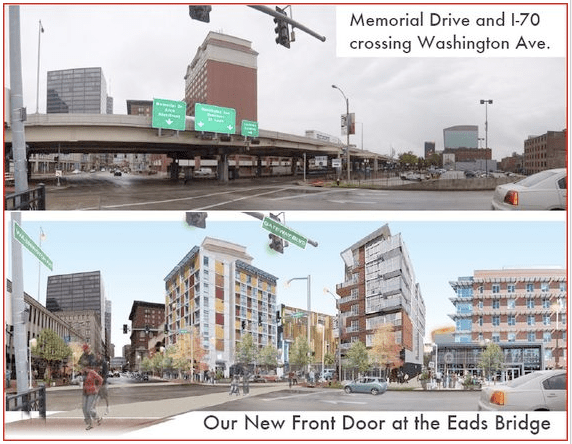
For three years, grassroots advocates in St. Louis have been pressing for the removal of elevated portions of I-70 through downtown. This group of urbanists and architects, with little to no financial support, came together to make the case for highway removal.
Calling themselves City to River, the group built a website and a nonprofit organization and, over time, a pretty diverse coalition around the idea. They lined up support from residents and businesses along the corridor, as well as preservationists, park advocates, and local foundations.
A big victory came last year when the Partnership for Downtown St. Louis, a business group that is funding a comprehensive study of connections between downtown and the riverfront, insisted that the teardown concept be examined.
But advocates were dealt a blow this week when the planning firm Bernardin, Lochmueller and Associates, which conducting the study, announced it would not produce an in-depth analysis of the teardown that could lead to further action. Otis Williams of the St. Louis Development Corporation, which is overseeing the study, told the St. Louis Post Dispatch that consultants had not completed the overall access study by the deadline and would need some additional funding and another six months to complete it. Williams blamed the delay on the highway teardown concept. "We had to stop and have a discussion about that,” he said. The budget for the study, $90,000, was insufficient to properly evaluate the highway teardown as well as the other concerns, he said.
City to River's Alex Ihnen said the move was shortsighted. “What they’re doing is eliminating conversation about this for 20 years,” he told the Post Dispatch. But Ihnen's group hasn't given up. They may seek funding to conduct their own study. Alternatively, he told Streetsblog, they may just work to keep the issue on a "slow boil" in the community's consciousness until a political opportunity presents itself. Ihnen said urban officials are very focused on the redesign of the Gateway Arch Grounds on the riverfront at the moment.
Once that planning process is complete, in the next few years, officials may be ready to shift their attention to I-70. But without strong support from local institutions and elected officials, it has been difficult for the grassroots group to elevate their proposal beyond the concept phase, Ihnen said.
"The people in charge of the official planning don’t really want to put any resources into examining this idea," he said. "It’s not surprising. We kind of know we’re kind of politically overmatched."





